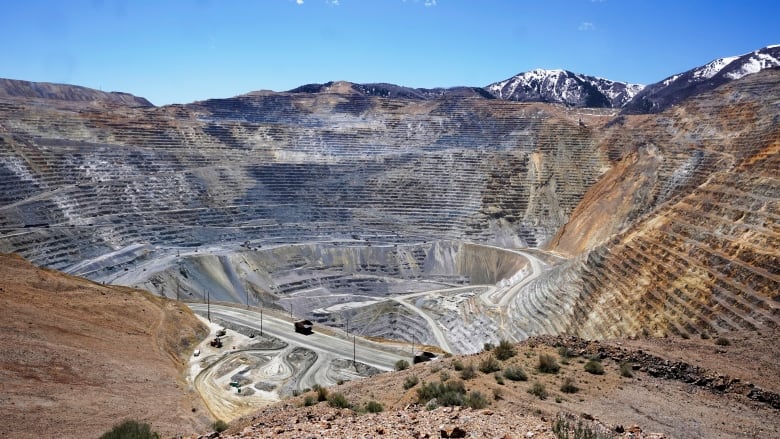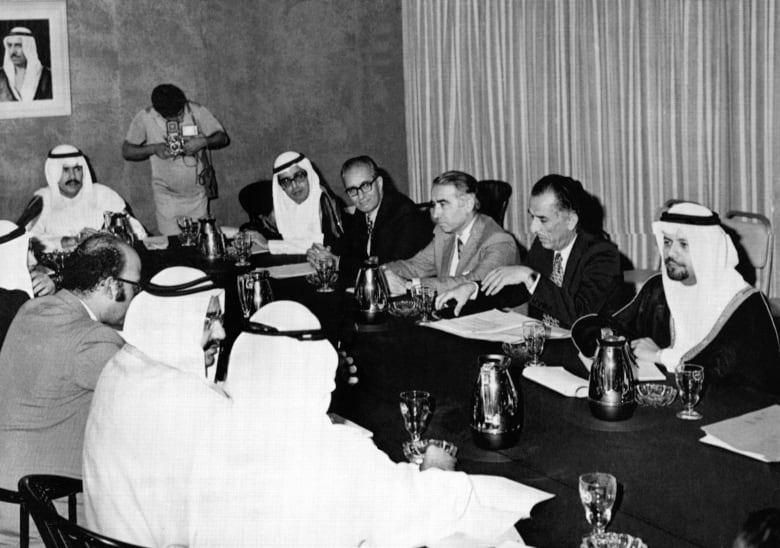
Table of Contents
Minerals wanted to energy the inexperienced transition from fossil fuels might develop into “the Twenty first-century model of the ‘oil weapon,'” warns an inside examine commissioned by Canada’s Division of Nationwide Defence.
There’s widespread settlement amongst scientists that drastic cuts in fossil gasoline consumption are wanted to stave off catastrophic local weather change — and a transition to electrical automobiles, wind and solar energy kind key pillars of this shift.
However as international locations race to undertake extra electrical applied sciences, traders and governments are battling to manage entry to commodities like copper, lithium and uncommon earths from distant areas. This has led many observers to concern that the inexperienced transition might have echoes of the stress and violence characterizing the worldwide pursuit of oil.
“The explosive development of digital units up to now decade, coupled with fast-moving advances in inexperienced applied sciences resembling wind energy and electrical autos, are driving the rise in demand for REEs [rare earth elements],” stated the examine produced for DND in 2020, and accessed beneath freedom of knowledge laws.
“REEs are additionally essential for nationwide safety as they’re key substances within the manufacturing of a wide range of defence-related elements and purposes,” stated the examine. “Any disruption to the provision of uncommon earths might have severe financial and nationwide safety impacts all over the world.”
Uncommon earth parts are a group of 17 commodities with names like neodymium, cerium and yttrium. They’re key elements for superior applied sciences, together with hybrid autos, laser-guidance programs and flat-screen displays.
Analysts stated the final development of competitors for management additionally applies to different minerals wanted for the vitality transition, resembling copper and lithium.
The paper stated that China “has already proven that it’s keen to make use of its uncommon earths as a political weapon,” citing Beijing’s 2010 transfer to halt REE shipments to Japan following the latter’s detention of a Chinese language fishing crew throughout a maritime border dispute.
China controls about 90 per cent of the world’s provide of uncommon earth parts, stated the examine, which warned that clear know-how minerals may very well be a “Twenty first century model of the ‘oil weapon’ that Arab international locations used throughout the 1973 OPEC embargo,” when petroleum exports had been halted to the U.S. in retaliation for Washington’s assist for Israel.
Almost 100 pages of DND’s inside recordsdata had been withheld, underscoring the sensitivity of knowledge surrounding entry to those sources.
The Division of Nationwide Defence declined an interview request. In emailed feedback, a spokesperson stated the examine, carried out for DND by Canada’s Nationwide Analysis Council, has not led to any direct actions from the navy. It has, nevertheless, “knowledgeable broader departmental discussions which might be ongoing.”
DND is in talks with the U.S. over the international locations’ “shared defence industrial base,” the spokesperson stated.
‘Stress multiplier’
To gasoline the inexperienced transition, environmentalists concern demand for brand spanking new mines, typically in distant and ecologically delicate areas, will result in contamination in addition to violence between communities and traders.
These native conflicts might rise in tandem with geopolitical strife between international locations and companies as energy brokers jockey to manage more and more invaluable sources in every single place from South American rainforests to Canada’s Far North and the Democratic Republic of Congo.

“We’re already seeing extra conflicts at the native stage,” stated Donald Kingsbury, an assistant professor of political science on the College of Toronto who research mining in Latin America, of the renewable vitality growth.
“It is a rigidity multiplier,” Kingsbury stated of latest mineral demand linked to the vitality transition. “We see it setting the stage for future conflicts down the highway.”
Demand for copper is predicted to double by 2050, the CEO of the commodities buying and selling big Glencore predicted final yr, that means the world might want to extract 60 million tonnes yearly.
Producing one electrical automobile requires greater than twice as a lot copper as a gas-powered car, based on the Paris-based Worldwide Power Company (IEA). A clean-energy car additionally wants minerals not utilized in conventional automobiles, together with cobalt, lithium and graphite.
Lithium demand is projected to spike greater than 40-fold by 2040, based on the IEA, with demand for graphite, cobalt and nickel rising greater than 20-fold.
Attending to internet zero emissions “requires a really monumental world shift, a copper-intensive world system for renewable energy,” stated Daniel Earle, CEO of Solaris Assets, a Canadian-listed mining firm. “You’re mainly speaking about an effort to affect all the pieces you’ll be able to.”
A scramble for Ecuador’s untapped sources
Earle is hoping to capitalize on this new demand in an impoverished nook of southeastern Ecuador.
Solaris desires to construct an open-pit copper mine on a 286-square-kilometre concession, extracting a couple of billion tonnes of fabric close to the border with Peru. If the Warintza challenge receives its environmental permits and meets different necessities, copper mining on the web site might begin as early as 2026, Earle stated.
It is in locations like this, a biodiverse area and hotbed of unlawful mining accessible nearly solely by helicopter, the place the scramble for sources linked to the vitality transition is heating up.

Earle stated the greatest copper initiatives already working, together with Chile’s big Escondida mine, the world’s largest, don’t have the capability to satisfy the brand new demand. He expects smaller operations in additional distant areas, just like the Solaris plan, to proliferate globally.
Lengthy depending on oil revenues and reticent about approving new mines, Ecuador’s authorities is within the means of permitting extra mineral extraction, stated Nathan Monash, president of the nation’s Chamber of Mines.
He acknowledged that the rise in mining exercise might replicate a few of the “geopolitical points” which have plagued the oil sector. However he insisted firms in Ecuador have a “dedication to native communities” after “studying so much from extraction insurance policies up to now.”
“All neighbours can have disagreements, however basically it comes all the way down to belief,” Monash stated. “Is there belief constructed up between native stakeholders and mining firms?”

Federico Velásquez, Solaris’s vice chairman of operations, careworn that Indigenous Shuar communities residing round its proposed mine assist the challenge, as a result of guarantees of jobs and infrastructure in certainly one of Ecuador’s poorest areas.
Different Indigenous teams in Ecuador, together with the Governing Council of the Shuar Arutam Folks, which represents dozens of communities within the area, have referred to as on the federal government to droop the challenge.
“These actions [by Solaris] violate our authentic choice to say ‘No to Mining’ in our territory, a call protected by our proper to self-determination and different collective rights,” stated Josefina Tunki, the group’s president, in an announcement final yr.
Native environmentalists are additionally involved in regards to the new mines, fearing water contamination, forest destruction and long-term injury to distant ecosystems, stated Nathalia Bonilla, president of the Quito-based conservation group Accion Ecologica.
Embargo fears
The mining trade argues these initiatives are needed for combating local weather change, creating jobs and transferring Ecuador past its dependence on oil extraction. If a agency like Solaris would not construct the copper challenge, they are saying, another person would possibly.
“China is the dominant participant in pure sources in Ecuador,” stated Solaris CEO Earle. Chinese language firms are taking “100 per cent” of the copper concentrates from the Mirador mine positioned close to the Warintza challenge, he stated, and nearly all of Ecuador’s oil manufacturing.
“Chinese language mining firms have gotten the leap on Western mining firms.”
China’s embassy in Ecuador didn’t reply to interview requests.
In addition to its rising presence in South America, China continues to manage the marketplace for uncommon earths “and is the chief in uncommon earths analysis and growth,” stated the examine for DND, main some analysts to imagine Beijing might doubtlessly block gross sales of the commodities during times of strife.
There was a comparable scenario within the oil market of the Seventies. In the course of the 1973 Arab-Israeli Warfare, Center Jap nations from the Group of Petroleum Exporting Nations (OPEC) cartel imposed an embargo on oil gross sales to the U.S. as retaliation for Washington’s assist for Israel throughout the battle.

The embargo led to a spike in oil costs and excessive inflation, launching an period of financial malaise within the West. From 1973 to 2013, between one-quarter and one half of interstate wars had been linked to grease, based on analysis revealed within the journal Worldwide Safety.
The scenario is akin to right now’s oil market, with costs at report ranges as a result of Russia’s warfare in Ukraine, persistent inflation and different elements.
A spokesperson for Pure Assets Canada stated the federal government is working to “develop a complete understanding of Canada’s mineral wants over the medium to long run,” with practically $4 billion proposed within the newest price range for a crucial minerals technique to spice up provides.
To keep away from replicating the errors of the oil period, the College of Toronto’s Kingsbury stated the shift to electrification mustn’t imply a “Tesla in each storage.” Enhancing emissions-free public transit and making cities walkable would do extra to struggle local weather change than persevering with to perpetuate the Nineteen Fifties mannequin of suburban sprawl, he stated.
After an inevitable surge in extraction of new minerals for the transition, there needs to be a push for a extra round economic system, Kingsbury stated. This could enable, for instance, lithium to be recycled from outdated batteries quite than continuously mined.
Nathalia Bonilla from Ecuador’s Accion Ecologica agrees. She stated the struggle in opposition to local weather change should not contain international locations and communities battling over useful resource deposits or wrecking rainforests with a plethora of latest mines.
The inexperienced transition, she stated, “needs to be about consuming much less supplies, no more.”
Learn the examine commissioned by Canada’s Division of Nationwide Defence:
The journey and reporting for this story had been funded by a grant from the World Reporting Centre and Social Sciences Humanities and Analysis Council.




